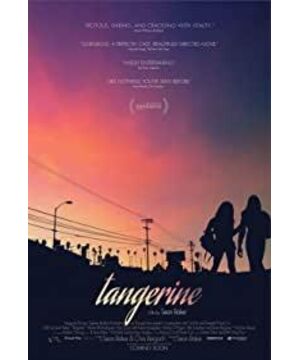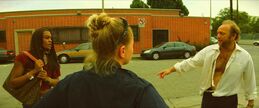But the movie doesn't want to tell you that, or how many painful and twists the process of betrayal and separation from "he" to "she" has gone through; it doesn't want to say what it means when you decide to trade your body for bread when you have no money and no way out; The journey of the heart that everyone hates. Too much film reportage is being talked about, highlighting sin, hardship, pain and helplessness. Instead, it unknowingly separates the audience from the people in the film and pushes them to the edge.
No, this one doesn't and I don't want to say that.
I just want to say that as a person, a few people, a group of people, they have their own dreams, expectations, desires for love, and friendships they value, as well as the helplessness of life and the loneliness of survival hidden behind them.
It seems like everyone is the same. Take off the bright or dark ugly or deviant or orthodox bright various shells, the helplessness of life, the loneliness of survival, really seems to be the same sometimes. Maybe this is what the human group has in common, and we need to work hard to fight against some kind of nothingness with fate.
Even if the protagonists in the story seem to catch horses a little bit more; it's like helping a boyfriend who thinks he loves to hide drugs and get out of prison and find out that his boyfriend changes his girlfriend is like playing with it. It's a little sad; it's like Paying for someone else to give me a chance to sing is a bit embarrassing that few people are listening to it; it seems a bit bleak that I was beaten and slipped all the way back to the den to find myself replaced.
That's the point, how should we live in the future, the slips have to be hidden, the business has to be done, and the old customers have to stay. Maybe one day you save enough money, you're lucky enough to make a record, make a fortune, and make a movie to get out of such a stereotyped life - like Mia Taylor who plays Alexandra in the movie. Maybe life is still like this, catching mistresses, hiding from swindles, fighting wits with customers, complaining with friends, arguing with each other, looking down on each other, and even sleeping with each other's boyfriends, and the result is still doing laundry. When they meet in a house or on a road full of palms, they smile and lose their grudges.
The sunset in Los Angeles is different every day, and the state of mind is constantly changing, but I am grateful for this moment, for having each other in my life, and for this moment, even in a life that looks like shit to outsiders.
The director expresses the day when little people on the edge of Los Angeles are catching horses in a more intimate and communicative way. In addition to the protagonist, the involved prostitutes, boyfriends, bar owners, taxi drivers, and Asian doughnut shop owners, who just dig a dig. There can be a bunch of survival stories that may not be so "great" to sell.
However, there is no bitterness and hatred in the film, no high-level preaching, or forcibly pulling you to empathize. This seemingly relaxed and cheerful expression is deep enough to penetrate flesh and blood.
The soundtrack constantly escalates the drama, especially the scene in the doughnut shop. The emotional tension is absurd and realistic, and it has the characteristics of postmodernism. Even shooting with an iPhone is unconventional.
The provocative and thought-provoking parts in the movie are deliberately handled cleanly and restrained, so far as they are, without going into depth or sublimation, but allowing people to resonate with them. This effect is more easily understood and respected.
You see, it looks like a bit of bullshit, but emotional helplessness and pull are real. You are not experiencing different forms of experience in your own life.
View more about Tangerine reviews











